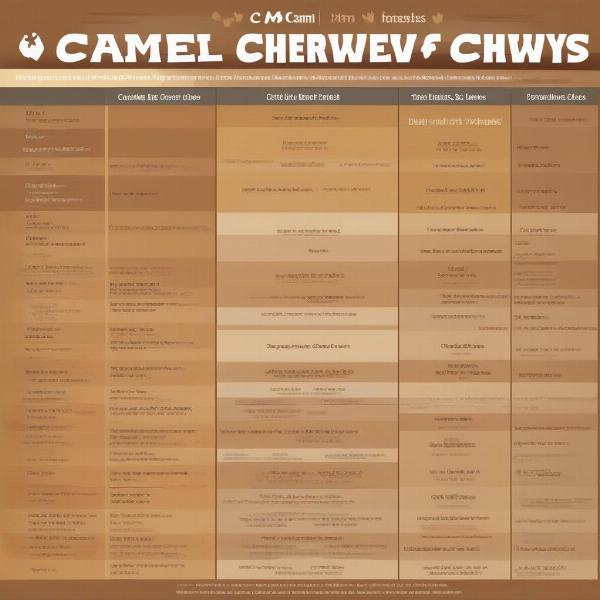Camel skin chews have become increasingly popular treats for dogs. But are they a good choice for your furry friend? This guide will delve into the benefits and drawbacks of camel skin for dogs, helping you decide if this exotic chew is right for your canine companion. We’ll explore nutritional value, safety concerns, and best practices for introducing camel skin into your dog’s diet.
The Benefits of Camel Skin Chews for Dogs
Camel skin chews are a natural, single-ingredient treat that can offer several benefits for dogs. They are a good source of protein and can help satisfy a dog’s natural chewing instinct. This can be especially helpful for puppies who are teething or dogs who tend to chew destructively.
- Dental Health: The tough, fibrous texture of camel skin can help scrape away plaque and tartar, promoting good dental hygiene. Chewing also helps stimulate saliva production, which can further aid in cleaning the teeth and gums.
- Long-lasting Chew: Unlike some other chews, camel skin tends to be quite durable, providing long-lasting entertainment for your dog. This can be beneficial for dogs who get bored easily or those who need an outlet for their chewing energy.
- Hypoallergenic: Camel skin is generally considered hypoallergenic, making it a suitable option for dogs with food sensitivities or allergies. This is because it is less likely to trigger allergic reactions compared to chews made from common allergens like beef or chicken.
- Digestible: Camel skin is typically easier to digest than rawhide or some other chews, reducing the risk of digestive upset. However, it’s crucial to supervise your dog while they are chewing and remove any small pieces they may break off.
Potential Risks and Considerations of Camel Skin for Dogs
While camel skin chews offer several advantages, it’s essential to be aware of the potential risks:
- Choking Hazard: As with any chew, there’s a risk of choking, especially if the dog breaks off and swallows large pieces. Always supervise your dog while chewing and choose a size appropriate for their breed and size.
- Digestive Issues: Although generally digestible, some dogs may experience digestive upset, particularly if they consume large quantities of camel skin. Introduce it gradually and monitor your dog for any signs of discomfort.
- Sourcing and Quality: The source and quality of the camel skin can impact its safety. Look for chews from reputable suppliers who prioritize ethical sourcing and processing.
Choosing the Right Camel Skin Chew for Your Dog
Selecting an appropriate camel skin chew involves considering your dog’s size, age, and chewing habits.
- Size: Opt for a chew that is appropriately sized for your dog to prevent choking hazards. Larger dogs require larger chews.
- Thickness: Thicker chews tend to last longer and are better suited for aggressive chewers.
- Shape: Camel skin chews come in various shapes, such as rolls, strips, and bones. Choose a shape that your dog finds engaging and enjoyable.
Introducing Camel Skin to Your Dog’s Diet
When introducing camel skin to your dog, start with small amounts and monitor their reaction. If they tolerate it well, you can gradually increase the amount. Always supervise your dog while they are chewing and remove any small pieces or splinters that break off.
“Always supervise your dog with any new chew, especially camel skin,” advises Dr. Emily Carter, DVM, a veterinary specialist in canine nutrition. “It’s essential to ensure they are chewing safely and not swallowing large pieces that could cause a blockage.”
Camel Skin vs. Other Chews
Camel skin offers a compelling alternative to other popular chews like rawhide. Unlike rawhide, which can be difficult to digest and pose a choking hazard, camel skin is typically easier on the digestive system. It’s also a more natural and less processed option.
“Many dog owners are seeking natural, long-lasting chews for their pets. Camel skin fits this bill perfectly,” notes Dr. Robert Miller, a certified professional dog trainer. “Its durability and hypoallergenic nature make it an attractive option for a wide range of dogs.”
 Comparing Camel Skin Chews with Other Chews
Comparing Camel Skin Chews with Other Chews
Conclusion
Camel skin chews can be a healthy and enjoyable treat for your dog. They offer dental benefits, long-lasting chewing satisfaction, and are often hypoallergenic. However, it’s crucial to choose high-quality products, supervise your dog while chewing, and be aware of potential risks like choking. By following these guidelines, you can help ensure your dog enjoys the benefits of camel skin chews safely.
FAQ
- Are camel skin chews safe for puppies? Yes, but always choose an appropriate size and supervise your puppy while chewing.
- How long does a camel skin chew typically last? The lifespan of a camel skin chew depends on the dog’s size, chewing habits, and the chew’s thickness. They generally last longer than rawhide.
- Where can I buy high-quality camel skin chews? Look for reputable pet supply stores or online retailers that specialize in natural dog treats.
- Can camel skin chews upset a dog’s stomach? While generally digestible, some dogs may experience mild digestive upset. Introduce it gradually.
- What should I do if my dog swallows a large piece of camel skin? Contact your veterinarian immediately.
- Are camel skin chews good for dogs with allergies? Yes, camel skin is often a good option for dogs with allergies.
- Are camel skin chews messy? They can be slightly messy, but generally less so than some other chews.
ILM Dog is a leading international website dedicated to providing expert advice on dog care and well-being. We offer a comprehensive resource for dog owners worldwide, covering everything from breed selection and health care to training and nutrition. Whether you’re a new dog owner or a seasoned expert, ILM Dog provides practical, trustworthy information to help you provide the best possible care for your canine companion. Contact us today for expert advice: Email: [email protected], Phone: +44 20-3965-8624. For more valuable insights and tips, visit ILM Dog.